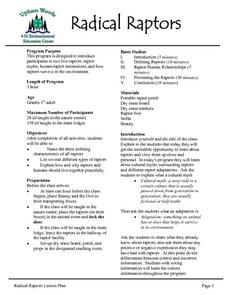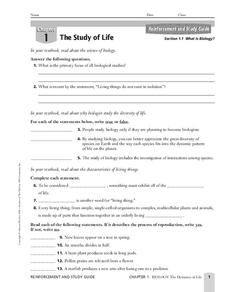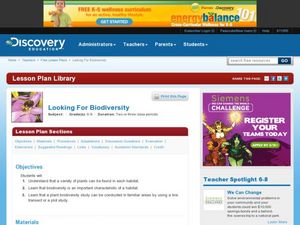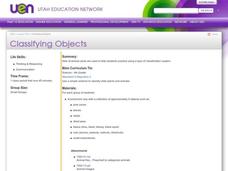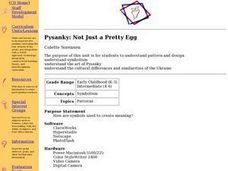Curated OER
Spot Identification of Some of the Most Common Insect Orders
Students investigate the basic characteristics of insect orders and develop short-cut techniques to identify insects into twelve of the most common orders. They use captured specimens and photographs to practice identification and then...
Curated OER
Save the _____ Story Board
Students research an endangered species. They examine statistics, characteristics, and information about the species. Students play "webmaster" and design a site that will help to save an endangered species.
Curated OER
Habitat Cards
Students discuss the relationship between a habitat and the environment. In groups, they use the internet to research the relationship between the animals and the habitat on their card. They present their information to the class to...
Curated OER
HAPPY SOIL, SAD SOIL
Students will be able to identify the characteristics of healthy soil and unhealthy soil.Take the class outside to an area of thick grass near trees, if available. Compare the
clothes people wear to the thin cover. Discuss the reasons...
Curated OER
Happy Accidents with Watercolors
Students practice the basic characteristics of painting with watercolors. They learn basic color theory using the color wheel and will be able to identify primary and secondary colors.
Curated OER
Radical Raptors
Students are introduced to raptors and their role in the environment. They identify three characteristics of raptors and list several types of raptors found in nature. They discuss their positive and negative experiences with raptors and...
Curated OER
Mollusks
In this mollusks activity, learners will review the characteristics of the three major classes of mollusks: gastropods, bivalves, and cephalopods. This activity has 17 matching, 6 short answer, 9 fill in the blank, and 4 true or false...
Curated OER
What is Biology?
In this science of biology instructional activity, students will review the concepts relating to biology including the characteristics of living things, the process of reproduction, adaptations, and evolution. This instructional activity...
Curated OER
Arthropods
In this arthropods worksheet, students complete a graphic organizer by reading characteristics of the different classes or subphylum and writing in examples for each of these groups.
Curated OER
Where Are the Dinosaurs?
Students create a dinosaur egg with balloons and newspaper. In this earth science lesson, students explore the extinction of dinosaurs. Students view a web clip and relate it to the extinction of animals they have never seen.
Curated OER
Place Names
Students investigate the meaning of various Native American names. In this Native American language lesson, students locate state names that come from Native American descriptions and mark them on a map. Students then suggest a name for...
Curated OER
Looking for Biodiversity
Students explore habitats and see that there are a variety of plants that can be found and that biodiversity is an important characteristic. In this biodiversity lesson students complete an activity that explains how to perform a...
Curated OER
Habitats
Students participate in an online instructional activity to determine that different plants and animals are found in different habitats. They use food chains to show feeding relationships in a habitat, and see that nearly all food chains...
Curated OER
Winter
Learners examine how animals adapt to the harsh New England winter. They discuss articles they have read on the subject.
Curated OER
Classifying Objects
Fourth graders work in small groups to sort and classify a variety of objects. They develop criteria for sorting and explain the characteristics they chose for classification. Groups record and share their classifications.
Curated OER
Food Web Follies
Seventh graders cut and paste animal pictures to create a food web and trace the path of energy. They write a paragraph explaining the importance of photosynthesis in all food webs.
Curated OER
Ocean Life
Students research and identify ocean animals characteristics and life styles using the Internet and books. They create a PowerPoint presentation and an iMovie to present to the class.
Curated OER
Verterbrate Classification
Students are introduced to the broad categories of vertebrates including fish, amphibians, reptiles, birds and mammals. They identify the characteristics of each group and then view slideshows and video of example species.
Curated OER
Critters & Complementary Colors
Students discover how specific colors compliment each other. Students use paints and pictures of animals to create a picture with analogous color harmony. They explain the characteristics of analogous colors.
Curated OER
Pysanky: Not Just a Pretty Egg
Students examine the art of Pysanky. Using the Internet, they identify the cultural similarities and differences between the United States and the Ukraine. Using Pysanky's art, they discover the symbolism he used in his artwork and...
Curated OER
Finding Caterpillars
Students examine how animals protect themselves from predators and camouflage themselves. They participate in a simulation in which they locate red and green yarn "caterpillars," organize their data, and generate a bar graph using...
Curated OER
What Do You Know About the Birds Around You?
Students compare and contrast various species of birds. After participating in a brief discussion of the characteristics of birds, they view birds in their natural habitat and in pictures with a focus on the similarities and differences...
Curated OER
Look to the North: A Wolf Pup Diary
Students explore the book, Look To The North: A Wolf Pup Diary. They find five facts about wolves and discuss with their groups. Students explore the timeline of a wolf pup and create a food chain for three of the animals found in the book.
Curated OER
The Intertidal Zone
Students research the diverse animal and plant life that inhabit the intertidal zones along the Pacific rocky coast. As students progress through this lesson, they begin to recognize distinct behaviors, adaptations, and characteristics...







